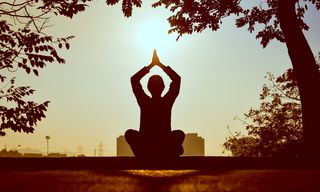
Meditation
Why Meditation Worked for Me
Some notes on engaging with the present.
Posted March 18, 2019

I've recently been experiencing mood swings, pretty dramatic ones. I'd descend into dark and negative thoughts and then rebound into exuberant spirits. Sometimes vice versa. Up or down, it's a spiral of echoing thoughts, like a reverberation that gets louder over time instead of softer. I'd have moments of pure inspiration where I felt like productivity and creativity came naturally. Then I'd give up on all my work as useless and subpar. It was becoming an issue.
I don't think the problem stemmed from something like bipolar disorder. It could be, and that'd be fine, but the symptoms are acute, not chronic. Rather I think they've were brought on by instability in my environment. I've spent the last few months applying to graduate school, and that left my days unstructured. My goals were all long term. No immediate positive feedback was available. I didn't have any social structure built into my days, like co-workers or a cohort. Boston became cold and I felt less and less like leaving the house except when compelled to, which was rare as no one ever really needed anything from me. What long-term goals I did have were uncertain—what if I don't get into grad school? Then what? All of this left me feeling untethered.
As a result, my thoughts had been consumed by the future at the expense of the present. My mental life revolved around far-off questions, unanswerable in the immediate term: Will I get into grad school? Am I good enough to do the things I want to do? What exactly do I want to do? In moments of belief, I'd work myself up into a frenzy of positivity, ready to tackle anything. In moments of doubt, I'd gather the dire storm clouds of negativity and sink into despair. Even when it wasn't that dramatic, it was unsettling.
Then I began meditating.
It's been something that had been on my mind to do, and I started a few months ago. It was an off-the-cuff decision, as the good ones so often are. Really the motivation came because Sam Harris's meditation app came out for Android. I like Sam Harris well enough, though I'm no super-fan. However, I was drawn to the idea of having a set course of meditation guided by someone I could relate to and trust (his background is in neuroscience and he has studied meditation extensively) that was designed for a novice like me. From day one, I noticed an immediate effect.
The meditation practice covered in Waking Up combats exactly the kind of thought-spirals I had been facing. It's about taking stock of what's happening in the mind at the present moment. Reserving ten minutes of my day to connect with that temporal center of gravity has made a world of difference. Not always, but most days. It's proved great for maintaining composure in an unstructured, self-motivated lifestyle. Even if I do get into a Ph.D. program, I'll still largely be in charge of my own time, as I was during my two years at Harvard.
But there's been another side of meditation that has also proved rewarding. In my studies as a cognitive scientist, I've spent a lot of trying to understand the mind from an objective perspective. What processes underlie thought? How does it all work? But I've spent almost no time trying to understand the experience of what it is actually like to have a mind. Cognitive science is in large part about putting together an objective account of subjective experience. With meditation, I've started to explore the first-hand, experiential component of what's going on in my own mind. Connecting these two points of view has been really interesting, something that I'm excited to give continued consideration.
Now several months into my meditation practice, I've seen a huge improvement in my mental well-being. There are two general trends that I've noticed. The first is that I am more skilled at quelling my internal voice when it starts to shout. Having devoted time to combating such anxiety I can now more easily call that calming ability into service. This has done a lot to diminish my mood swings. The second and perhaps more important trend is a broader re-centering on the present. I've worked a lot on engaging more directly with the present moment and spending less time immersed in contemplation of the future. This trend has been larger than just meditation, but the practice gave me the mental preparation I needed to be open to such a re-centering. I still have goals and future plans, but they don't occupy the same prominent position in my mental space on a daily basis. It's made a big difference.
At any rate, I wanted to share my experience to say that if you've been struggling with the same kind of ups-and-downs in your internal milieu that I faced, then perhaps meditation is worth a shot. Good luck!

